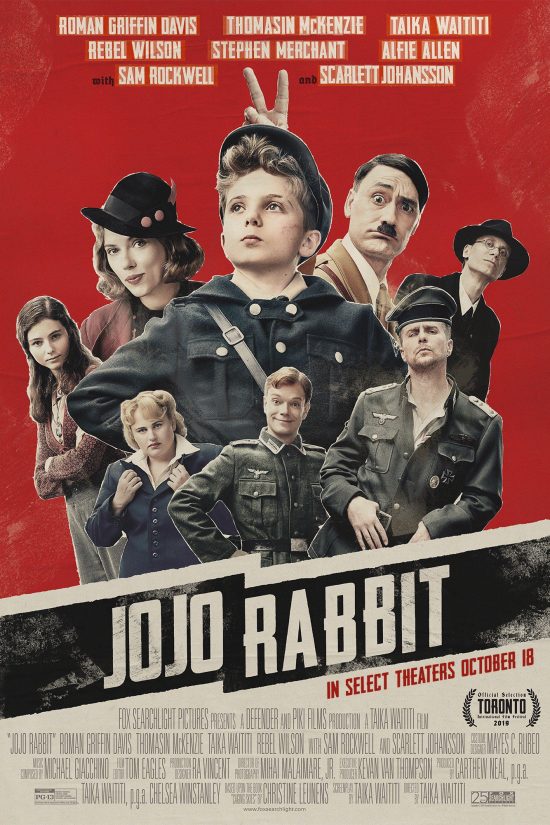TIFF 2019 Review: Jojo Rabbit – “There is sensitivity here and a more meaningful message”

Photo by Kimberley French. © 2018 Twentieth Century Fox Film Corporation All Rights Reserved. Image courtesy of TIFF
The opening of Jojo Rabbit sets the scene for what is to come – The Beatles singing “I Want to Hold Your Hand” in German as black and white video shows hoards of people jumping and cheering for… Adolf Hitler. Reserved laughs come from the audience as they try to navigate “Is this funny? Should I be laughing?” The answer comes courtesy of the film’s press notes in the form of a Mel Brooks quote: “If you can reduce Hitler to something laughable, you win.” Director Taika Waititi channels this in what he labels an ‘anti-hate satire’.
Jojo (Roman Griffin Davis) is a ten-year-old boy growing up in Nazi Germany. He’s fallen for the propaganda hook line and sinker, and cannot wait to start his training as part of The Hilter Youth. Jews are the enemy and his best friend is actually only his second-best friend – he’s reserving that number one spot for the Führer himself. Until he can manage to befriend the leader, he talks to him as his imaginary friend (Taiki Waititi, also supporting here), and this imaginary, good-natured Adolf provides him with encouragement and confidence, especially as Jojo’s father is away fighting in Italy.
But Jojo’s rise within the Nazi ranks is never meant to be, a series of events sending him to instead work in an office under a disgraced soldier (Sam Rockwell) and his assistants (Alfie Allen, Rebel Wilson). One day upon returning home from his work painting the town with propaganda and handing out conscriptions, he hears a noise upstairs in the attic. He is horrified to learn a Jewish girl is living behind the walls of his sister’s room, his mother (Scarlett Johansson) having offered her a hiding place. As Jojo and the hidden Elsa (Thomasin Harcourt McKenzie) embark on an unsteady understanding, he starts to realize that all he thought he knew may have been wrong all along.
The cast here is excellent with young Roman Griffin Davis playing the perfect Jojo. Despite his political leanings, he is a character that earns empathy and his journey is well scripted by Waititi’s screenplay. McKenzie, coming off of the critical success of last year’s Leave No Trace, has another nuanced performance here as Elsa. Surrounded by an exemplary supporting cast, this assembled group of actors is able to pull off Waititi’s unique brand of satire with ease.
Waititi smartly always keeps our perspective within Jojo’s frame of reference and without such a strong creation the film would falter. He brings his own sense of style and humour to the source material, Christine Leunens‘ novel Caging Skies. And while the film definitely has many laugh-out-loud moments, Waititi also knows exactly when to alter the tone of the film in order to bring it back from the edge. In essence he has created exactly what he set out to achieve – a strong message of humanity.
Jojo Rabbit has been divisive with critics during the Toronto International Film Festival, but audiences there, which selected it as the ‘People’s Choice Award’ winner, the festival’s biggest prize, clearly didn’t feel conflicted. I never felt its satirical take crossing the line. It toes it certainly, perhaps at points even hovers one foot over, but there is sensitivity here and a more meaningful message. I fully expected the film to be at moments, robustly ridiculous, but what I didn’t expect was how moving Jojo would become and how poignant its finale would feel.











